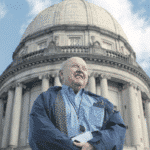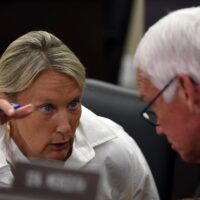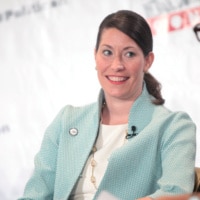Pretend it’s the end of the 2024 presidential election. Either Republican Michael Adams or Democrat Charles “Buddy” Wheatley is Kentucky’s secretary of state, a job that includes overseeing elections in the Bluegrass State.

Michael Adams
Date of Birth: March 27, 1976
City of residence: Thornhill
Occupation and previous public service: Attorney, Kentucky secretary of state (2020-present)
Campaign website: michaelgadams.com
Quote: “We’ve done more in three years to make it easy to vote and hard to cheat than our predecessors were able to do in 200 years.”
The losing candidate in the state’s presidential election calls Kentucky’s secretary of state and asks him to “find” enough votes to overturn the Kentucky results — and threatens him if he fails to do so.
That’s what former President Donald Trump, a Republican, did on Jan. 2, 2021, in a phone call to Georgia Secretary of State Brad Raffensperger in his unsuccessful bid to win another four years in the White House.
The call led to Trump’s indictment in Georgia for interfering in the 2020 election.
“I would terminate the call,” said Adams, a Louisville attorney who is seeking another four-year term as Kentucky’s secretary of state on the Republican ticket.
“I would inform the attorney general. I would inform the FBI, basically any members of my bipartisan task force, state police and federal partners. I would make them aware and certainly notify my legal counsel. No good would come out of a call like that.”
Would he terminate the call even if the presidential candidate was his own party’s nominee? Yes, said Adams.

Charles “Buddy” Wheatley
Date of birth: Feb. 28, 1961
City of residence: Covington
Occupation and previous public service: Former Covington fire chief; state representative (2019-2003
Campaign website: buddyforkentucky.com
Quote: “I will be a secretary of state that fiercely protects and promotes Kentuckians’ fundamental rights of free and fair elections.”
It was inappropriate for Trump to have made that call to Georgia’s secretary of state, he said.
Democrat Wheatley, a lawyer and former state representative and fire chief of Covington, said he would tell the candidate — regardless of party— that Kentucky has reported its results and they are official by our state laws “and nothing will change because of that.”
Asked if Trump’s call was wrong, Wheatley said, “I think the Georgia secretary of state did the right thing.” Raffensperger opened up an investigation of the call and informed authorities about it.
Across the nation, the public office of secretary of state has taken on more consequence and visibility with recent election disputes.
Adams and Wheatley each say they are the best person to handle that job in Kentucky in their hopes of winning the Nov. 7 general election.
The secretary of state is Kentucky’s chief election officer, chief business official as keeper of start-up papers and other corporate records, and chief advocate for civic engagement. The job pays $148,108.56 a year. It is a constitutional office and is often referred to as being on the “down ticket,” meaning it is below the power of the governor’s office.
For the race so far, Wheatley has raised more campaign funds —$165,692 — but Adams leads with receipts — $225,345. That is because Adams took out a $156,000 loan for his campaign, according to the latest records from the Kentucky Registry of Election Finance.
Here’s a look at some of the major issues in the race and the candidates’ views on them.
Making it easier to vote
On his campaign website, Wheatley says, “Kentucky is still one of the most restrictive voting access states in the Union. In 2022, we actually made it harder to vote. I will bring back more polling locations and precincts to make it easier to vote.”
Asked why he’s saying that, Wheatley said, “For several reasons, including we have only three early voting days, our polls close at the earliest time in the country at 6 p.m., felons can’t vote except for executive order, and we don’t allow independents to vote in the primaries.”
Wheatley is calling for “more poll locations, more poll workers and more access to the polls so our elections truly reflect the voters of Kentucky.”
He said in recent years that Adams has presided over a drastic reduction of polling places replaced by super center voting locations. “It’s really discouraging.”
Adams strongly disagrees with Wheatley’s assessment of voting in Kentucky.
“Kentucky makes it easier to vote than a lot of blue states on the East Coast. If it is restrictive in any way, it’s because Mr. Wheatley’s political party ran this Capitol and office for 100 years. It wasn’t until I won that we increased voter access. They did nothing.
“All his party ever brought to this office is corruption,” said Adams, referring to his predecessor, Democrat Alison Lundergan Grimes, who was fined $10,000 by the Executive Branch Ethics Commission for what the panel determined was improper use of voter data that benefited her and others. Grimes, secretary of state from 2012 to 2020, has denied any wrongdoing and said she would appeal the commission’s fine.
Adams said Kentucky is the only red and southern state to make it easier to vote in the last three years.
Debates: The candidates are scheduled to participate in two joint appearances — Oct. 9 on the Kentucky Educational Television network and Oct. 19 with the League of Women Voters of Kentucky.
The KET face-off starts at 8 p.m. in Lexington. The League debate in Louisville will begin at 1 p.m. and is co-sponsored by WLKY-TV.
He said that came about because Democratic Gov. Andy Beshear and he worked together during the COVID-19 pandemic to make voting easier. Their changes included early voting and more use of absentee ballots. The legislature later made those changes permanent though not as generous as they had been for the 2020 election during the first year of the pandemic.
“That’s why I have broad support from both parties,” he said, noting that he took flak from some in his own party. One dubbed him “Benedict Adams.”
“My campaign welcomes support from all Kentuckians. I do not take the race for granted, nor should anyone who wants fair, free, accessible and secure elections.”
Adams said he would like to see more voting but several obstacles have to be overcome.
Adams noted that it’s becoming more difficult to find workers at the precinct polls and locations to conduct voting.
Adams said some churches have stopped being voting locations, especially since there was a constitutional amendment dealing with abortion on the ballot last year in conflict with their teachings.
Some schools chose to no longer be voting locations after COVID-19, he said.
Adams also said he would like to see more early voting but that would require more personnel, especially in county clerks’ offices.
And the need has not been shown to have more voting days in primary or non-presidential general elections, he added.
About 45 percent of the vote cast in the 2020 presidential election came in early voting, said Adams, but last year only 15 percent of the voters voted early in the primary.
“There is no design on my part to suppress voters, just the opposite,” said Adams. “I am the father of early voting. My opponent likes to say I’m a voter suppressor. That is ridiculous. He lacks credibility. I have risked my neck to get people to vote.”

Adams’ freelance work
The Lexington Herald-Leader reported in January that Adams sometimes does outside legal work for Republican clients.
Wheatley said Adams’ freelance work is “a conflict of interest, sometimes with some seedy people.”
But Adams said the extra work only amounts to a few hours each week and does not interfere with his job as secretary of state.
“It takes zero hours from my state job,” said Adams. “By the way, Wheatley also practiced law when he was a state representative.”
Allowing more felons to vote
One of Gov. Andy Beshear’s first acts as governor in December 2019 was to restore the right to vote for at least 140,000 former felons who had fully completed their felony sentences for nonviolent or nonsexual crimes. The number of people who have had their voting rights restored due to the order has now grown to 190,726, according to his administration.
Both Wheatley and Adams said they would encourage whoever is the next governor to continue that policy, maybe even pushing a constitutional amendment for it.
Both candidates also say they support giving independents the right to choose to vote in primary elections.

Wheatley’s job suspension as fire chief
At this year’s Fancy Farm picnic, Adams brought up Wheatley’s 2008 two-week suspension as Covington fire chief for violating city policy by consuming alcoholic beverages prior to operating a city-issued vehicle and wrecking it.
The Covington city manager said Wheatley in February 2008 was suspended without pay for two weeks after he crashed a city-issued 2000 Ford Crown Victoria in Hebron, totaling it head-on.
Wheatley had to make restitution to the city for the vehicle and lost a merit-based pay raise.
Wheatley said during a recent interview that he was never charged with any wrongdoing, but “simply made a mistake.” He said he has never been charged with any violation of the law in his life.
Wheatley also said if a similar incident had happened to Adams 15 years ago he would have not brought it up in this year’s race.
Adams said he did not believe that. He said the issue reflects on d Wheatley’s judgment while on the job.
This article is republished under a Creative Commons license from Kentucky Lantern, which is part of States Newsroom, a network of news bureaus supported by grants and a coalition of donors as a 501c(3) public charity. Kentucky Lantern maintains editorial independence. Contact Editor Jamie Lucke for questions: info@kentuckylantern.com. Follow Kentucky Lantern on Facebook and Twitter.
Jack Brammer, a native of Maysville, has been a news reporter in Kentucky since 1976. He worked two years for The Sentinel-News in Shelbyville and then from 1978 to 2021 in the Lexington Herald-Leader's Frankfort bureau. After retiring in December 2021 from the Herald-Leader, he became a freelance writer for various publications. Brammer has a master's degree in communications from the University of Kentucky and is a member of the Kentucky Journalism Hall of Fame.






